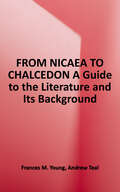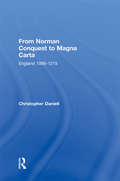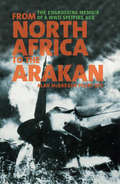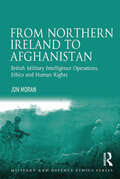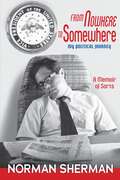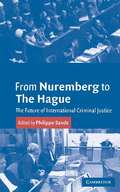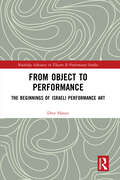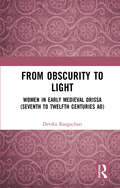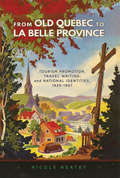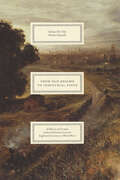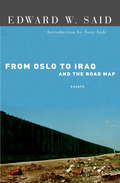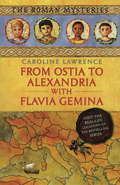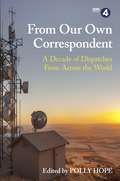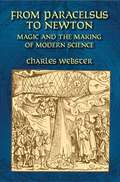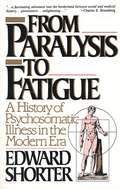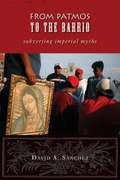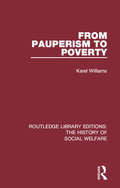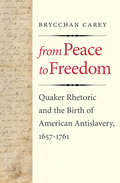- Table View
- List View
From Nicaea to Chalcedon: A Guide to the Literature and Its Background
by Frances M. YoungIn this volume, a world-renowned scholar of early Christianity updates and expands her classic survey of the writers and writings of the golden age of Greek patristic theology. This reliable guide to Christian literature from the late third century to the mid-fifth century is more accessible than specialized works on individual authors but more informative than coverage provided by general histories and reference works. The second edition has been revised throughout for use by a new generation of students and scholars and includes a new chapter and updated bibliographies.
From Night Flak to Hijack: It's a Small World
by Reginald Levy Alex SchiphorstThis is the autobiography of Reginald Levy, a British pilot who reached a total of 25,090 flying hours in over 40 years of civil, military, and commercial aviation. He recounts his training and military operations as an RAF pilot during the Second World War. He flies 44 types of aircraft between 1941 and 1981. He takes part in the Berlin Airlift, and in 1952 joins Sabena airline. In 1972, he is hijacked by Black September terrorists, and plays a heroic part thanks to his professionalism and training. Not only does the book offer an insight into the hardships and camaraderie of the war and of the Cold War, it also gives a first-hand report of a Palestinian terrorist attempt. Two of the Israeli commandos who freed the hostages would go on to become Prime Ministers of Israel—Barak and Netenyahu! The epilogue is provided by his youngest grandson.
From Norman Conquest to Magna Carta: England 1066–1215
by Christopher DaniellUsing a combination of original sources and sharp analysis, this book is sheds new light on a crucial period in England’s development. From Norman Conquest to Magna Carta is a wide-ranging history of England from 1066 to 1215 ideal for students and researchers throughout the field of medieval history. Starting with the build-up to the Battle of Hastings and ending with the Magna Carta, Christopher Daniell traces the profound change England underwent over the period, from religion and the life of the court through to arts and architecture. Central discussion topics include: how the Papacy became powerful enough to proclaim Crusades and to challenge kings how new monastic orders revitalized Christianity in England and spread European learning throughout the country how new Norman conquerors built cathedrals, monastries and castles, which changed the English landscape forever how by 1215 the king's administration had become more sophisticated and centralized how the acceptance of the Magna Carta by King John in 1215 would revolutionize the world in centuries to come. This volume will make essential reading for all students and researchers of medieval history.
From Normandy to Auschwitz
by Paul Le GoupilThe odds on Paul le Goupil living to see the end of the Second World War let alone the 21st Century were negligible in 1944. Yet he did.As his extraordinary memoir describes, as a young man he found himself caught up in the maelstrom of the Second World War, active resistance to, and defiance of, the German occupation came naturally to Paul but led to his capture, beating and interrogation by the Gestapo and solitary incarceration in first French prisons. Worse still was to come and after an appalling journey and various labor camps he ended up in Auschwitz and Buchenwald. He experienced starvation, slave labor, unbelievable hardship—death for many was a relief.Paul survived but his suffering was not over as he and others had to endure a nightmare march before being liberated by the advancing Russians. All this and far more make this memoir an unforgettable, moving and inspiring account.
From Normandy to the Baltic: The Story of the 44th Lowland Infantry Brigade of the 15th Scottish Division from D Day to the End of the War in Europe
by AdvocateThis is the story of the 44th Lowland Infantry Brigade of the 15th Scottish Division from D Day until the surrender of the German armies in May 1945.The story is written by one who had the very great honour to be a member of the Brigade HQ staff of the Lowland Brigade throughout the whole period. The writer had also been previously in the Brigade during the greater part of the war, while in the United Kingdom. The story is a catalogue of events as seen and experienced by one man; the indulgence of those who took part in the events described is, therefore, craved for the many inaccuracies which will no doubt be apparent. At the same time, Brigade HQ was probably the best place for getting a bird’s-eye view of operations as a whole, and the account may perhaps be found to be more objective than if the writer had been in one of the battalions. Use has been made of the records of Brigade HQ to check the facts, but not those of the battalions, and the writer has also had the benefit of the help and advice of many officers of the Brigade, to whom his thanks are due.
From North Africa to the Arakan: The Engrossing Memoir of WWII Spitfire Ace
by Alan McGregor PeartAn ace fighter pilot recounts his experiences fighting the Germans and the Japanese from Malta to Burma in this WWII combat memoir. Born in New Zealand in 1922, Alan Peart always dreamed of becoming a Spitfire pilot. During the Second World War, he volunteered for the Royal New Zealand Air Force, and after distinguishing himself in training, joined the elite 610 Squadron. He served in numerous theaters of combat, from Italy and North Africa to India and Burma, where he took part of the Arakan Campaign. Operating from 'Broadway' airstrip, his was the only spitfire not destroyed during air strikes. In this lively account, Peart puts readers in the cockpit as he achieves ace status in heated combat against both German Luftwaffe and the Japanese Army Air Force. He also details the appalling living conditions and the issues the aircrew faced living far from civilization. After miraculously surviving World War II, Peart became president of the Burma Star Veterans association.
From Northern Ireland to Afghanistan: British Military Intelligence Operations, Ethics and Human Rights (Military and Defence Ethics)
by Jon MoranMoran concentrates on three aims: to provide an overview of British military intelligence operations in the last 30 years which concentrates on operational not strategic intelligence; to examine the debates over ethics and effectiveness that have followed these operations; and to examine the increasing attempts to place military intelligence under the same type of regulation that police and security intelligence operations have been subject to. As such, he provides a timely overview of intelligence effectiveness and ethics in this area of heightened interest and relevance in terms of the recent UK deployments to Iraq and Afghanistan, and in the light of the UK Strategic Defence Review. This book is not a philosophical discussion of military ethics; nor is it a study of operations alone. In the light of experiences from Northern Ireland to Afghanistan, it examines the debates over effectiveness which have surrounded British military intelligence activities whilst tying these debates closely to the ethical issues they raise. Each stage of operations is evaluated in context. Interest will cut across disciplines and as such this book will appeal to intelligence, counter-terrorism, military studies, politics, human rights and philosophy practitioners, scholars and students.
From Nowhere to Somewhere: My Political Journey
by Norman ShermanNorman Sherman's idea of fun is attending a political convention. He has been active in progressive politics since before he could vote, often as a ghostwriter and editor of speeches and books. His story describes a life working for numerous political leaders including Minnesota Governor Orville Freeman, and Minnesota senators Wendell Anderson, Walter Mondale, and Hubert Humphrey. He was press secretary to Vice President Humphrey, including during the 1968 campaign. He describes the world of politics with good humor and grace.
From Nuremberg to the Hague: The Future of International Criminal Justice
by Philippe SandsThis fascinating collection of papers examines the evolution of international criminal justice.
From Object to Performance: The Beginnings of Israeli Performance Art (Routledge Advances in Theatre & Performance Studies)
by Dror HarariFrom Object to Performance identifies, analyses, and critically contemplates the advent of a “performance mentality” and the gradual maturation of a “performative turn” in Israeli art.Manifested in the transition from object-oriented art to performance-based art, this cultural moment reflected both the exposure and responsiveness of young Israeli artists to experimental currents in North American and Western European art and these artists’ need to respond to acute social and political conditions, questioning Israeli national myths and collectivist ideals. From Object to Performance offers the first comprehensive exploration of the origins of action and performance art in Israel, contributes an important component to unravelling the global enigma of performance art histories, and considers the historiographic challenges encountered when studying the emergence and early years of performance-based practices. This book will appeal to students and scholars of performance studies, art history, cultural studies, and Israel studies, as well as to curators of contemporary art and performance, and artists. The book should also be of interest to the growing number of theater and art historians who research the beginnings and development of action and performance art.
From Obscurity to Light: Women in Early Medieval Orissa (Seventh to Twelfth Centuries AD)
by Devika RangachariThis book attempts to reintegrate women into the socio-political milieu of early medieval Orissa. Its sources are inscriptions, mostly Sanskrit, that date from the seventh century to the end of the reign of the Imperial Ganga ruler, Anantavarman Codagangadeva (CE 1078-1147). The evidence indicates that royal and non-royal women had varying but undeniably important roles to play in the socio-political fabric of this prominent regional entity. The Bhauma-Kara dynasty (c. mid-eighth/ninth-late tenth century) that witnessed the rule of six women, four of them in succession, is a case in point. In addition, the palpable presence of several other royal and non-royal women is consistently documented in the epigraphic record. This is an aspect that has received very little attention in secondary works, thereby rendering this study a pioneering one.The work follows on from Rangachari’s earlier Invisible Women, Visible Histories: Gender, Polity and Society in North India (7th to 12th century ad), which had focused on important gendered aspects of early medieval north India through an analysis of literary and epigraphic sources of Kashmir, Kanauj, Bengal and Bihar. The invisibilization of women, whereby their presence is routinely ignored or trivialized, was, similarly, its underlying essence. Please note: This title is co-published with Manohar Publishers, New Delhi. Taylor & Francis does not sell or distribute the Hardback in India, Pakistan, Nepal, Bhutan, Bangladesh and Sri Lanka
From October to Brest-Litovsk
by Leon TrotskyTrotsky's account of the revolutionary events in Russia in 1905. Trotsky's ideas form the basis of Trotskyism, a term coined as early as 1905 by his opponents in order to separate it from Marxism. Trotsky's ideas remain a major school of Marxist thought that is opposed to the theories of Stalinism.
From Oikonomia to Political Economy: Constructing Economic Knowledge from the Renaissance to the Scientific Revolution
by Germano MaifredaRenaissance Europe witnessed a surge of interest in new scientific ideas and theories. Whilst the study of this 'Scientific Revolution' has dramatically shifted our appreciation of many facets of the early-modern world, remarkably little attention has been paid to its influence upon one key area; that of economics. Through an interrogation of the relationship between economic and scientific developments in early-modern Western Europe, this book demonstrates how a new economic epistemology appeared that was to have profound consequences both at the time, and for subsequent generations. Dr Maifreda argues that the new attention shown by astronomers, physicians, aristocrats, men of letters, travellers and merchants for the functioning of economic life and markets, laid the ground for a radically new discourse that envisioned 'economics' as an independent field of scientific knowledge. By researching the historical context surrounding this new field of knowledge, he identifies three key factors that contributed to the cultural construction of economics. Firstly, Italian Humanism and Renaissance, which promoted new subjects, methods and quantitative analysis. Secondly, European overseas expansion, which revealed the existence of economic cultures previously unknown to Europeans. Thirdly factor identified is the fifteenth- and sixteenth-century crisis of traditional epistemologies, which increasingly valued empirical scientific knowledge over long-held beliefs. Based on a wide range of published and archival sources, the book illuminates new economic sensibilities within a range of established and more novel scientific disciplines (including astronomy, physics, ethnography, geology, and chemistry/alchemy). By tracing these developments within the wider social and cultural fields of everyday commercial life, the study offers a fascinating insight into the relationship between economic knowledge and science during the early-modern period.
From Old Quebec to La Belle Province: Tourism Promotion, Travel Writing, and National Identities, 1920-1986 (Studies on the History of Quebec/Études d'histoire du Québec #34)
by Nicole NeatbyTourism promoters strive to brand their destinations in anticipation of what they think travellers hope to experience. In turn, travel writers react in part to destinations in line with their expectations. While several scholars have documented such patterns elsewhere, these have remained understudied in the case of Quebec despite the frequency with which the province was branded and rebranded and its status as a major North American travel destination in the decades leading up to Expo 67. The first comprehensive history of Quebec tourism promotion and travel writing, From Old Quebec to La Belle Province details changing marketing strategies and shows how these efforts consistently mirrored and strengthened French Quebec's evolving national identity. Nicole Neatby also takes into account the contentious role of English-speaking promoters in Montreal, belying the view that Quebec was unvaryingly represented and appreciated for being "old." Taking a comparative approach, Neatby draws on books and a wide array of newspapers, popular and specialized magazines, and written and visual sources from outside the tourist genre to reveal how the distinct national and cultural identities of English Canadians, Americans, and French Quebecers profoundly shaped their expectations and reactions to the province. From Old Quebec to La Belle Province traces and explains shifting promotional priorities for tourism and travel writers' varying reactions over the course of four decades, and how these attitudes harmonized with evolving national identities.
From Old Regime to Industrial State: A History of German Industrialization from the Eighteenth Century to World War I (Markets and Governments in Economic History)
by Richard H. Tilly Michael KopsidisIn From Old Regime to Industrial State, Richard H. Tilly and Michael Kopsidis question established thinking about Germany’s industrialization. While some hold that Germany experienced a sudden breakthrough to industrialization, the authors instead consider a long view, incorporating market demand, agricultural advances, and regional variations in industrial innovativeness, customs, and governance. They begin their assessment earlier than previous studies to show how the 18th-century emergence of international trade and the accumulation of capital by merchants fed commercial expansion and innovation. This book provides the history behind the modern German economic juggernaut.
From Omaha Beach to Dawson's Ridge
by Cole C. KingseedAn infantry company commander in the U.S. Army's heralded 1st Infantry Division, Capt. Joseph Turner Dawson led his men through some of the most brutal battles of World War II. From the invasion of North Africa in late 1942 through Sicily and the assault on Normandy to the push toward the German frontier late in 1944, his length of service on the frontlines was extraordinary, and his heroism while holding off the Germans on a ridge near Aachen, Germany, is legendary. Based on Dawson's own combat journal, this book focuses on leadership in combat during the greatest human drama of the twentieth century. Dawson is at the heart of the drama as he describes the strain of constant combat and its effect on the combat infantryman. His writings have been edited by the former chief military historian at the U.S. Military Academy at West Point, Col. Cole C. Kingseed, who succeeds masterfully in capturing the essence of combat leadership through the actions of this citizen-warrior. Although Dawson was an Army officer, the lessons his journal offer cut across service lines to help readers understand what makes a good frontline commander. The book is published in cooperation with the Association of the U. S. Army.
From Omaha to Okinawa
by William Bradford HuieIn this rousing sequel to his classic Can Do! The Story of the Seabees, William Bradford Huie continues the saga of the combat trained civilian plumbers, carpenters, heavy equipment operators, wharf builders, and civil engineers who served in the U.S. Navy construction battalions. The story begins in 1944 with the battle for Iwo Jima when the Seabees braved concentrated enemy fire and Iwo's daunting terrain to rig floating causeways, blow up wrecked landing craft, and drive their bulldozers up three terraces that rose from the ocean to secure the beachhead. This book fully chronicles their heroism, including the unforgettable efforts of the men of the 31st Battalion who crawled the length of a landing strip to pick up shrapnel as Japanese snipers fired away.Huie does equal justice to the historic actions of the Seabees on D-Day at Omaha Beach, where they manned fifteen hundred vehicles during the first wave of landings at Normandy. He provides fascinating accounts of the creation and testing of various pierheads, floating steel bridges, and "Rhino" ferries. His narrative of Seabee accomplishments is heavily laced with colorful stories of moonshining, brawling, and carousing juxtaposed with compassionate stories of the children in the prisoner of war camps. His enthusiasm for the Seabees gained instant acceptance when this book was first published in 1945 and is often cited as inspiring succeeding generations to rise to the same spirit of devotion and loyalty to their task.
From Oslo to Iraq and the Road Map
by Edward W. SaidIn his final book, completed just before his death, Edward W. Said offers impassioned pleas for the beleaguered Palestinian cause from one of its most eloquent spokesmen. These essays, which originally appeared in Cairo's Al-Ahram Weekly, London's Al-Hayat, and the London Review of Books, take us from the Oslo Accords through the U. S. led invasion of Iraq, and present information and perspectives too rarely visible in America. Said is unyielding in his call for truth and justice. He insists on truth about Israel's role as occupier and its treatment of the Palestinians. He pleads for new avenues of communication between progressive elements in Israel and Palestine. And he is equally forceful in his condemnation of Arab failures and the need for real leadership in the Arab world.
From Ostia to Alexandria with Flavia Gemina: Travels with Flavia Gemina (The Roman Mysteries #1)
by Caroline LawrenceFrom Morocco to Libya, from Ostia to Surrentum - Caroline Lawrence has travelled widely to give the Roman Mysteries unrivalled authenticity among historical novels. Her research trips have yielded a dazzling array of insights that allow Caroline to vividly re-imagine the ancient world and to bring her characters and stories to life. This book gathers together anecdotes, factual information and advice for children and their families looking to explore exotic locations, as well as offering compelling background to the real world behind the bestselling Roman Mysteries novels.
From Our Own Correspondent: Dispatches of a Decade from Across the World
by Polly Hope<p>For more than sixty-five years on the air, From Our Own Correspondent has been one of BBC Radio's flagship programmes. It has taken listeners to parts of the world where they have never gone, and perhaps never would: war zones, refugee camps, elite universities, space stations, spy academies and lions' dens of all sorts. Its dispatches introduce audiences to people they might never expect to meet - kingpins, revolutionaries, assassins and outcasts. It has always relied on the power of personal testimony, with its contributors not merely reporting the news, but sharing what they found out along the way, and how it felt. Its correspondents often relate the unexpected: the day they visited the town that is crazy about trout fishing, attended a forty-course Chinese banquet, experienced zero gravity on a flight with Russian cosmonauts, went mud wrestling in Turkey or ballroom dancing in Cameroon.<p> <p>Themed by continent and region, From Our Own Correspondent brings together the most compelling stories of the past ten years. It is a perfect primer for the understanding of the modern world.<p>
From Paracelsus to Newton: Magic and the Making of Modern Science
by Charles WebsterThe alchemist and physician known as Paracelsus (1493-1541) appears to have dwelt in a completely different intellectual world from Sir Isaac Newton (1642-1727). Newton's work lies in the lofty era of the Enlightenment and the modern world, while that of the enigmatic Paracelsus conjures up the superstitious lore of the Dark Ages. The rise of science and the decline of magic unfolded over many generations, and as this fascinating book shows, there existed remarkable elements of continuity between the world views of the early sixteenth and late seventeenth centuries.The essays contained in this volume constitute a slightly modified version of the Eddington Lectures, delivered at Cambridge in the autumn of 1980. In this masterly series of discourses, Charles Webster explores three test cases relating to prophecy, spiritual magic, and demonic magic. Focusing on evidence from Germany at the time of the Reformation and from England during the Restoration, these essays form a more balanced historical perspective on the epistemological shift that occurred between the ages of Paracelsus and Newton. They propose a view of the Scientific Revolution as a diverse phenomenon, the result of a dynamic interplay of forces emanating from many different directions, and all contributing to the process of creativity and change. 20 black-and-white illustrations. Introduction. Notes to each chapter.
From Paralysis to Fatigue: A History of Psychosomatic Illness in the Modern Era
by Edward ShorterThe first book to put the physical symptoms of stress in their historical and cultural context, Shorter's fascinating history shows how patients throughout the centuries have experienced symptoms of stress in tandem with the cultural shifts of larger society.
From Patmos To The Barrio: Subverting Imperial Myths
by David A. SanchezSanchez's subject is the power of imperial myths - and the subversive power unleashed when resistance movements take over those myths for their own purposes. Moving from John of Patmos's inversion of Roman imperial mythology in Revelation 12 to the indigenous appropriation of Spanish symbolism and mythology, drawn from Revelation 12, in 17th-century Mexico, Sanchez then explores the continuing power of the Virgin of Guadalupe to inspire movements for a better society in our own day.
From Pauperism to Poverty (Routledge Library Editions: The History of Social Welfare #24)
by Karel WilliamsFirst published in 1981, From Pauperism to Poverty consists of seven essays, three of which focus on the English poor law between 1800 and 1914 and four of which examine texts of social investigation by Mayhew, Engels, Booth and Rowntree. Rather than making a specialist contribution to the history of social thought and policy, the essays raise general questions about current ways of writing history and alternative analyses of specific texts or institutions are developed. In doing so, the previous histories of the relief of pauperism and the discovery of poverty are revised at many points. Most notably, it is demonstrated for the first time that relief to unemployed men was virtually abolished after 1850. This book will be of interest to those studying the history of social welfare and poverty.
From Peace to Freedom
by Brycchan CareyIn the first book to investigate in detail the origins of antislavery thought and rhetoric within the Society of Friends, Brycchan Carey shows how the Quakers turned against slavery in the first half of the eighteenth century and became the first organization to take a stand against the slave trade. Through meticulous examination of the earliest writings of the Friends, including journals and letters, Carey reveals the society’s gradual transition from expressing doubt about slavery to adamant opposition. He shows that while progression toward this stance was ongoing, it was slow and uneven and that it was vigorous internal debate and discussion that ultimately led to a call for abolition. His book will be a major contribution to the history of the rhetoric of antislavery and the development of antislavery thought as explicated in early Quaker writing.
